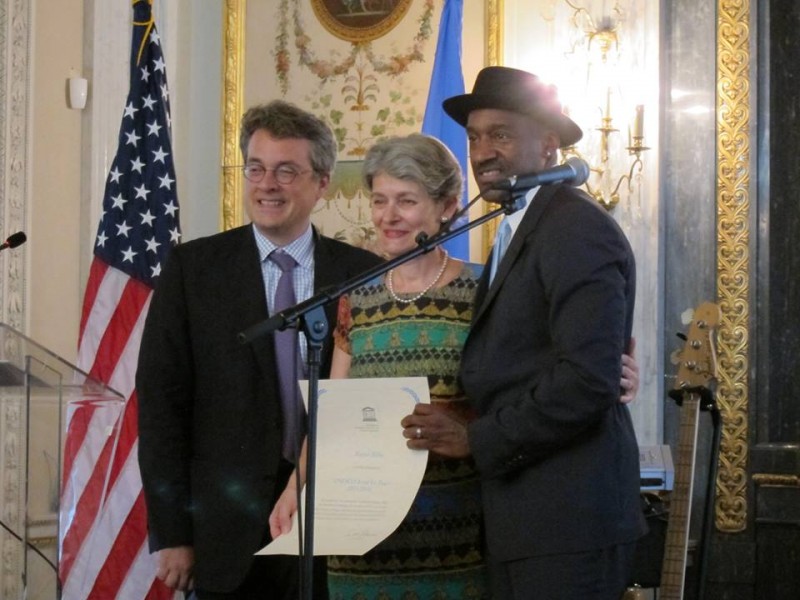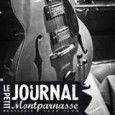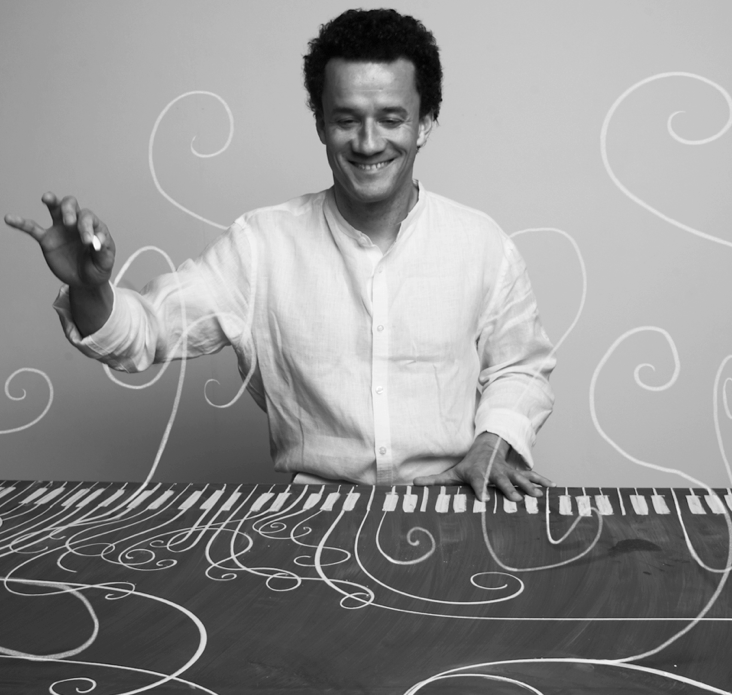On July 4th I had the honor of being named a UnescoArtist for Peace and Spokesperson for The Slave Route Project by UNESCO Director-General Irina Bokova, at a beautiful ceremony at Hôtel de Talleyrand in Paris, hosted by Ambassador David Killion, Permanent Delegate of the United States of America to UNESCO and his lovely wife, Mrs. Kristin Eager Killion.
This is a wonderful opportunity for me to work with the UNESCO team and the U.N. family to promote the message of peaceful co-existence. It is something that I have always wanted to do.
For a very long time, I have longed to get involved – empowering youth, promoting peace and fostering understanding amongst people all over the world. Yeas ago I wrote a song for Miles Davis – ‘Tutu’, dedicated to Desmond Tutu and to the struggle of South Africa during the Apartheid. The song became a success for Miles, and the work of Desmond Tutu and Nelson Mandela transformed South Africa in abolishing apartheid. Years later, when I performed in South Africa and was interviewed by a journalist who asked me how it felt to have contributed to the social movement that led to the end of Apartheid, I was taken aback. The journalist told me that the song ‘Tutu’ gave South Africans strength in knowing that Americans were thinking about them. Now when I wrote the song, I wrote it to raise awareness in the U.S. about Apartheid. I had no idea that the song could inspire South Africans themselves. That is when I realized the power of music.. Since then, I have tried to do this through my music, by working with people across countries, learning about the diversity of cultures and sharing my knowledge, and creating sounds and melodies that could connect and touch people in ways words cannot.
For me, ever since I was little, music was my bridge to understanding the world, people and my place in this universe. Music has brought me joy, has allowed me to expand my horizons, and has let me give something back to the world. I truly believe that the power of music can unite people all over the world in ways that meetings, conferences – and even speeches – cannot.
Nietzsche said that “without music, life would be a mistake”. I could not agree more. Music can express what is universal to all of us as human beings – our joys, our pains, our shared global history, and our common responsibility towards future generations. I truly believe that music can heal, create bonds and ease tensions, open a path for dialogue and provide a way for acceptance and mutual respect.
There are so many examples in history where music, despite politics, conflict and pain, has been the product, the motor and the inspiration behind social change and overcoming human adversity. Where all was thought to be lost, music allowed healing, survival and transformation.
One example that comes to my mind is the slave trade. This human travesty, which still continues today in our times, is something that could have decimated a population of people who were taken, shipped, sold and treated like animals across the world as objects. Slavery stripped Africans of their family, identity and home. It took away every basic human need and looking back at what happened, it is a miracle that people survived at all.
But slavery did not take away the ability nor the capability of the slaves. It did not take away their capacity to express themselves despite it all. I think of Congo Square in New Orleans, where slaves were allowed to dance and sing on their one day off from hard labor. I think of how it must have been, to have nothing else but songs and rhythms from your homeland to warm the spirits. This was the one thing that could not be taken away from them.
And through the creativity of slaves, like those in Congo Square, modern music as we know it today was born – jazz and blues, which were the roots of rock, pop, R+B and hip-hop.
Plato said that “music gives soul to the universe, wings to the mind, flight to the imagination and life to everything”.
To know that a new art form, a new kind of music and a new path to give meaning to life was born out of this tremendous suffering and deprivation, is to know that human beings can overcome anything and everything.
For me, this is the towering testimony that human dignity cannot be taken away from you. Expression, creativity and the human will to survive – these are all of the things that come to my mind when I think of slavery. It is the powerful capacity for human beings to overcome and to bear through the most unthinkable circumstances to change the course of history.
The respected historian Booker T. Washington said ‘You can’t hold a man down without staying down with him’. This year marks the 150th anniversary of the emancipation proclamation. Indeed, through emancipation, which is today celebrating its 150 year anniversary, freedom came not just for the slaves, but also for the Masters, and for humanity at large – slavery was abolished, and at the same time, the role of the oppressor, persecutor and violator of human rights was also abolished.
The story of slavery tells us that we can overcome. That the world can change for the better. And that we can do more than simply survive – we can soar!
The filmmaker Ken Burns says “History is a question of survival. Without any past, we will deprive ourselves of the defining impression of our being”. It is important to educate our youth on this history of slavery – not only the travesty of it, but also the story that tells us about the strength of the human spirit. We need to share our global past. Without it, we are lost. From our past, we can all learn about who we are, what has been possible, and where we can go together in the future.
It is my hope that I can contribute to this effort of raising awareness of this shared history, help to promote mutual understanding and hopefully, engage the youth around the world to learn about the past and think together about our future.
I am looking forward to working with the UNESCO team, the Member States of UNESCO, the NGO community, youth, artists and people all over the world.
I want to thank Herbie Hancock who is a UNESCO Goodwill Ambassador, and who launched International Jazz Day which is now celebrated in 196 countries.
At the ceremony it was a pleasure for me to perform my band and Nigerian born singer, Layori as well as with the American poet James Emmanuel, who has published over 300 poems and over a dozen books. He is the creator of Jazz-and blues haiku for which he has received numerous awards.
As an Artist for Peace, I will work with UNESCO to promote the lessons learnt from the tragedy of slavery and the slave trade, and how they can be used to address many of today’s major issues: national reconciliation, respect for cultural pluralism and the need to construct inclusive and just societies.



